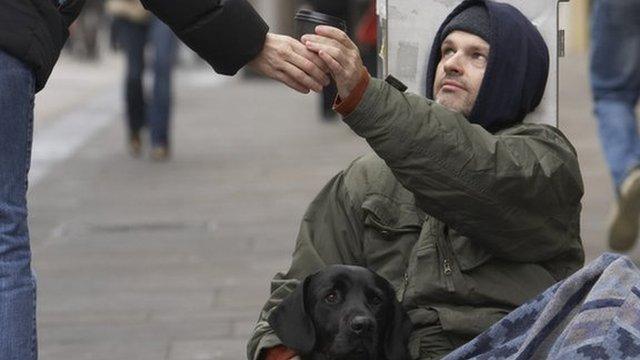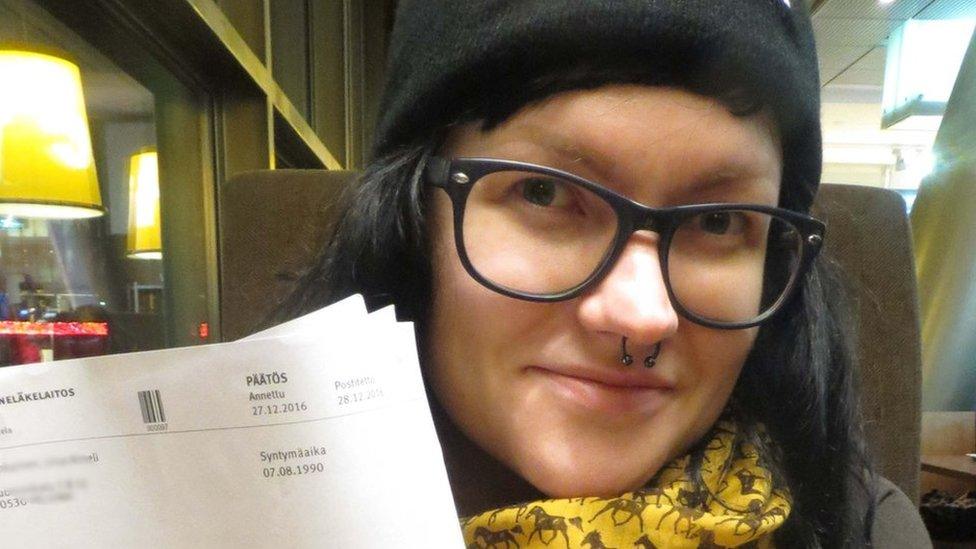Scottish government 'interested' in universal basic income
- Published

Universal basic income is seen as a way to reduce poverty and inequality
The concept of a universal basic income is of "interest" to the Scottish government as one potential option to reducing poverty and inequality.
Social Security Minister Jeane Freeman said she was "watching" the impact of pilots in Finland, Holland and Canada.
She also expressed interest in proposed pilot schemes in Glasgow and Fife.
A universal basic income offers all adults a non-conditional flat-rate payment. Models have varied, but in some any income they earn over this is subject to progressive rates of tax.
Ms Freeman told BBC Scotland that a universal income was worth considering but more evidence was needed to determine how effective it was.
'Very interested'
"We have a very strong commitment to reducing poverty and inequality and any idea that we think can contribute towards that, then we are very interested in it," she said.
"We are interested in the idea of the universal basic income and we're watching to see how that plays out in Finland where the government there is running a pilot and the Netherlands and Canada."
The minister said she was aware of similar projects planned for Glasgow and Fife but said there was a "difficulty in running pilots in Scotland".
Finland has started paying the benefit to a number of unemployed people.
Ms Freeman said the universal basic income was a proposal for "acting as an alternative to the bulk of the benefits system" and that she was unclear how this could be adequately evaluated in Scotland while the government did not have full control over the welfare system.
She added: "I'm not clear how it might work in Scotland but that doesn't mean to say I'm discouraging people who want to test that out and be very interested in seeing how that progresses."
Early stage
Councillor Matt Kerr, executive member for social justice at Glasgow City Council said a universal basic income would remove "fear" from the lives of many people who were struggling financially.
"Every citizen would know that there was a level below which it wouldn't be acceptable for them to fall in terms of income," he said.
He said people would not have to worry about changes to their circumstances adversely affecting their living standards.
He also said this would eliminate anxiety about losing out on cash if someone came off benefits and started work.

The councillor said that the authority was at an early stage in working up a pilot scheme.
"We intend to take a paper forward to the executive committee in the next few weeks and that starts the process," he said.
If approval was given, Councillor Kerr said discussions would then begin with the Scottish government, academics and other partners, to shape the pilot scheme in a way that would enable an effective appraisal of its effectiveness.
Jamie Cook, head of RSA Scotland (Royal Society for the encouragement of Arts, Manufactures and Commerce), said the concept of a basic income was an old one but was gaining fresh traction due to the challenges posed by modern life.
"We are seeing the growth of automation as a challenge...and we're seeing changes in the nature of work," he said.
"I think its partly that the welfare state was very much a structure of its time and the world has changed dramatically since that period."
Mr Cook said the current welfare system could act as a disincentive to work.
He said a basic income could provide the security to try new things such as starting a business, while knowing that bills could be paid.
But he accepted that it was up to politicians and the public to arrive at an acceptable figure for a basic income.
- Published16 January 2017
